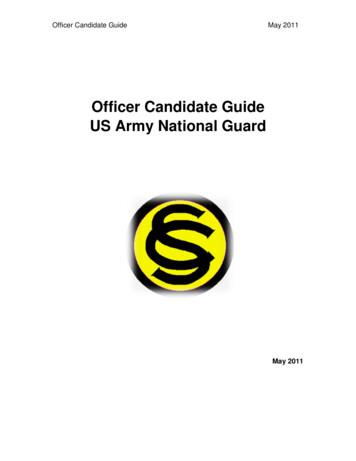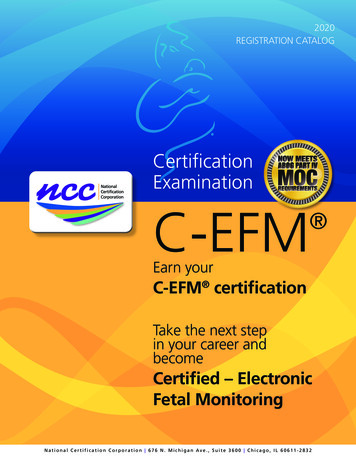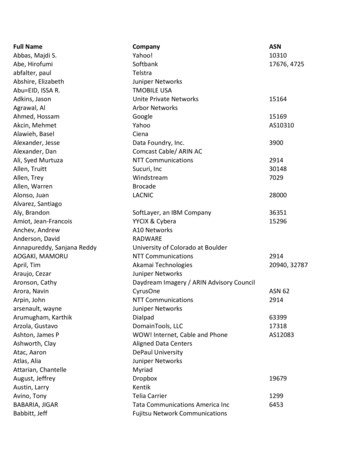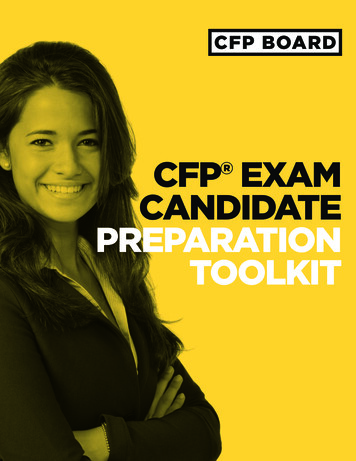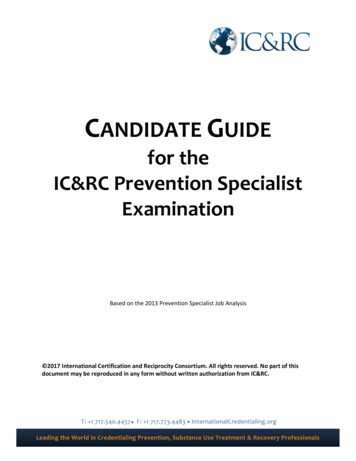
Transcription
CANDIDATE GUIDEfor theIC&RC Prevention SpecialistExaminationBased on the 2013 Prevention Specialist Job Analysis 2017 International Certification and Reciprocity Consortium. All rights reserved. No part of thisdocument may be reproduced in any form without written authorization from IC&RC.
ContentsPurpose of the Candidate Guide. 3Professional Testing Company . 3Examination Development . 3Eligibility Requirements and Registration . 3Administration . 4Dates, Time, and Location . 4Rescheduling, Cancelling, and Missed Examinations . 4Inclement Weather . 5Rules and Security . 6Special Accommodations . 6Scoring . 7Grievances, Test Disclosure, and Retakes . 10Format and Length . 11Content . 11Sample Questions. 33Reference List. 37Examination Reference List . 37About IC&RC . 392Updated 8/17
Purpose of the Candidate GuideThe purpose of this Candidate Guide is to provide candidates with guidance for the IC&RCexamination process. By providing candidates with background information on examinationdevelopment, administration, and content, preparation for an IC&RC examination can beenhanced.Professional Testing CompanyIt is the policy of IC&RC to administer valid, reliable, and legally defensible examinations. Toassist in this process, IC&RC has contracted with Schroeder Measurement Technologies (SMT)to develop, administer, and score all examinations.SMT is an established, full-service testing company. SMT serves the needs of licensing andcredentialing agencies with a wide range of test development and administration services.Examinations are administered through a division of SMT called ISO-Quality Testing, Inc. (IQT).IQT provides secure, user-friendly, high-quality, examination administration around the world.More information about SMT and IQT can be found at their websites: www.smttest.com andisoqualitytesting.comExamination DevelopmentThe development of a valid examination begins with a clear and concise definition of the tasks,knowledge, and skills needed for competent job performance known as a Job Analysis (JA).Using interviews, surveys, observation, and group discussions, IC&RC works with Subject MatterExperts (SMEs) in the field to delineate critical job components. These job components thenbecome the basis for questions on IC&RC examinations.Examination questions are written by certified individuals or those otherwise deemed as SMEsin the field. SMEs are trained in item writing best practices. Through the examinationdevelopment process, they are assisted by IC&RC’s professional testing company.Eligibility Requirements and RegistrationIC&RC examinations are administered exclusively by IC&RC Member Boards. Eligibilityrequirements and registration processes are determined by each Member Board. Candidatesinterested in taking an IC&RC examination must do so through a Member Board.Contact information for all Member Boards can be found atwww.internationalcredentialing.org.3Updated 8/17
AdministrationExaminations are administered via Computer Based Testing (CBT). Candidates are required totest at a designated IQT center. A list of all IQT testing centers can be found at this px?cnid 73 or by calling IQT toll free at 1-866773-1114.On the day of testing, candidates must bring a valid, government issued photo ID and theirCandidate Admission Letter. Candidates are strongly encouraged to read the CandidateAdmission Letter in its entirety to be aware of all testing policies and procedures.CBT examinations begin with a brief tutorial and end with a brief survey. Extra time is allottedto complete the tutorial and survey. A demonstration of the CBT examination format can befound at https://www.iqttesting.com/Default.aspx?Function SampleExam&Exam 8.Dates, Time, and LocationExaminations are offered on-demand based on the availability of each testing center. Once acandidate has met the eligibility requirements of their IC&RC Member Board to sit for anexamination, they will pre-register candidates for the examination through an on-line testdatabase. Candidates will receive an e-mail from registrations@isoqualitytesting.com withfurther instructions on scheduling an examination date, time, and location.Rescheduling, Cancelling, and Missed ExaminationsExaminations must be cancelled or rescheduled 5 days or more PRIOR to the scheduledexamination date. Cancelling or rescheduling an examination is done directly through IQT’swebsite at www.iqttesting.com.Complete instructions are listed below. For technical assistance, please contact IQT toll free at 1-866-773-1114.1. Visit www.iqttesting.com.2. Select “Exam Registration.”3. Log in using the username and password provided to you in your pre-registration email.If you forgot your password, click the “forgot password” link and it will be emailed toyou.4. Select “IC&RC” from the organization dropdown menu and click the “Next” button.5. To reschedule an examination, click “edit.” This will cancel your current examinationdate and prompt you to immediately select a new date.6. To cancel an examination, click “cancel.” Once your examination is cancelled, you canlog on to www.iqttesting.com at a later date to select a new examination date. Please4Updated 8/17
note, your designated testing window to take the examination will remain the same.7. An email confirmation will be automatically sent to you when you cancel or rescheduleyour examination.Candidates will be required to pay a rescheduling or cancellation fee to IQT before they areable to reschedule or cancel an examination. Acceptable forms of payment are Visa, MasterCard or American Express.Candidates are unable to reschedule or cancel an examination less than 5 days PRIOR to theirscheduled examination. Exceptions are made only for the following reasons: jury duty, death inimmediate family1 within 14 calendar days of the examination date, illness or medicalcomplication within 14 calendar days prior to the examination date OR the scheduledexamination date, and military deployment.If one of these prevents a candidate from testing, they must contact IQT directly and providesufficient documentation of the event that has occurred. Documentation must be submitted toIQT within 14 calendar days of the missed examination. There will be no additional fee incurredunder these circumstances. IQT can be reached toll free at 1-866-773-1114.If candidates fail to show up for an examination, do not have the proper identification orCandidate Admission Letter, they will not be permitted to sit for their examination. They will beconsidered a “No-Show,” examination fees will be forfeited, and they will be required to reregister and pay all fees to their IC&RC Member Board prior to scheduling another examination.Inclement WeatherIQT takes a proactive approach when monitoring inclement weather. They watch the progressof storms and keep in constant contact with their testing centers. If a testing center closes, IQTwill make its best effort to inform candidates. However, it is recommended that candidatescontact IQT directly at 1-866-773-1114 to confirm their testing center is still open on the dayof their examination.If a candidate is unable to make a testing appointment due to inclement weather but thetesting center does not close, they must contact IQT at 1-866-773-1114. IQT will confirm thatthere has been bad weather in the area and reschedule the examination.1The immediate family is a defined group of relations, used in rules or laws to determine which members of a person's familyare affected by those rules. It includes a person's parents, spouses, siblings, and children.5Updated 8/17
Rules and SecurityFailure to follow candidate instructions or conduct that results in violation of security ordisruption of the administration of an examination may result in dismissal from theexamination, voided examination scores, and forfeiture of examination fees.Examples of misconduct include, but are not limited to: Writing on anything other than the authorized scratch paper provided at theadministration siteLooking at other candidate's examinationDiscussing examination content before, during, or after administration orally,electronically, or in writing with any person or entityCopying or removing examination information from the testing areaUse of cellphones or other electronic devicesCandidates may not attend the examination only to review or audit test materials. Nounauthorized persons will be admitted into the testing area. All examination content is strictlyconfidential. Candidates may only communicate about the examination using appropriateforms provided within the examination delivery system.No books, papers, or other reference materials may be taken into the examination room. Anarea will be provided for storage of such materials.No questions concerning the content of the examination may be asked during the examinationperiod. The candidate should listen carefully to the directions given by the Proctor and read theexamination directions carefully.Special AccommodationsIndividuals with disabilities and/or religious obligations that require modifications in testadministration may request specific procedure changes, in writing, to their IC&RC MemberBoard PRIOR to scheduling an examination. With the written request, the candidate mustprovide official documentation of the accommodation requested. Submitted documentationmust follow ADA guidelines in that psychological or psychiatric evaluations must have beenconducted within the last three years. All medical/physical conditions require documentationof the treating physician’s examination conducted within the previous three months.Candidates should contact their IC&RC Member Board to inquire about other necessarydocumentation. Contact information for all IC&RC Member Boards can be found atwww.internationalcredentialing.org.Candidates will receive further information on scheduling an examination withaccommodations once their request has been reviewed and approved.6Updated 8/17
Candidates with accommodations will be held to IC&RC’s cancelling, rescheduling, and missedexamination policies2. In addition, a candidate with accommodations deemed as a “No-Show,”may be responsible for any fees incurred for the coordination of their accommodations inaddition to forfeiting their examination fee. Candidates will be required to pay these fees totheir IC&RC member board prior to scheduling another examination.ScoringReceiving Scores:All scores are reported to the designated IC&RC Member Board for distribution. IC&RC does nothave the authority to release scores. This process takes approximately two to three weeks.Preliminary scores are provided to candidates immediately following completion of theexamination. Candidates seeking their official scores should contact their IC&RC MemberBoard. Contact information for all IC&RC Member Boards can be found atwww.internationalcredentialing.org.Reporting Scores:Scores are reported on a scale ranging from 200-800 with a 500 passing. The minimum scaledpassing score is 500 for all examinations. Candidates are provided with official score letters thatreport a final scaled score and the percentages of items answered correctly in each contentdomain.Scaled Scores:Scaled scores are created when the number of questions answered correctly is mathematicallytransformed so that the passing score equals 500 on a scale starting at 200 and ending at 800.This transformation is very similar to converting inches to centimeters. For example, a 10-inchribbon is also 25.4 centimeters long. The length of the ribbon has not been changed, only theunits of measure to describe its length.The use of scaled scores allows for direct comparison of examination scores from one form ofthe examination to another. For security purposes, IC&RC keeps multiple forms of eachexamination in circulation at all times. Candidates are randomly assigned a form. The use ofscaled scores allows IC&RC to report scores for every form of an examination using the samescale of 200-800 with a 500 passing.2If candidates fail to show up for an examination, do not have the proper identification or Candidate Admission Letter, they willnot be permitted to sit for their examination. They will be considered a “No-Show,” examination fees will be forfeited, and theywill be required to re-register and pay all fees to their IC&RC Member Board prior to scheduling another examination.7Updated 8/17
The use of scaled scores does not influence whether a candidate passes or fails an examination.The passing of an IC&RC examination is always incumbent on achieving the minimum passingscore as it is determined in the process below.Determining a Passing Score:A candidate’s examination score is based on the total number of questions answered correctly.Candidates should answer each question, as no points are deducted for incorrect answers.The passing scores for IC&RC examinations are established through a process called standardsetting. During standard setting, a panel of Subject Matter Experts (SMEs) working in the field,determines the level of knowledge a candidate must demonstrate in order to pass theexamination. This level of knowledge is then converted into a cut score for each version of theexaminations. All candidates that meet or exceed the cut score for their version of theexamination will earn a passing mark.Use of Multiple Examination Forms:For every IC&RC examination, there are multiple forms of the same examination. Each form willuse different questions but test the same content. Examination forms are updated and replacedon a continuous basis to ensure the security and integrity of the program.The use of multiple forms for the same examination will not make it easier or more difficult forcandidates to pass one form of the examination. IC&RC’s testing company uses statistical dataon each test question to evaluate the difficulty of each examination form. The examinations areconstructed in order to minimize variations in difficulty from one form to another. The passingscores for each examination form are adjusted accordingly to account for any differences inform difficulty.Use of Pretesting Items:On each IC&RC examination, there are unweighted questions called pretest items. Pretest itemsdo not influence final scores or a pass/fail status. They are not identified on examinations andappear randomly. IC&RC uses pretest items to pilot newly written items to ensure quality priorto their use as a weighted item. Pretesting ensures the quality of future examinations andprovides verification that items are relevant to competency and measure proficiency.Failing Scores:Candidates who do not pass their examination are provided with percentages of correctlyanswered items in each content domain to better focus future study efforts. For securityreasons, candidates will not be provided with the total number of questions answered correctlyor a copy of the examination to review.8Updated 8/17
It is important to note that because the number of questions contained within each domain ofthe examination varies, adding or averaging the percentage correct scores in each domain willNOT be an accurate reflection of a candidate’s overall examination score.9Updated 8/17
Grievances, Test Disclosure, and RetakesExamination Grievances:All examination scores are final. Examination scores cannot be appealed.Candidates who believe an unusual event or condition related to the administration of theirexamination caused a significant adverse effect on their performance during their examinationmay submit a grievance regarding the administration to IC&RC for investigation.Grievances must be submitted to IC&RC within 14 calendar days of the examination. Grievancestatements must be submitted in writing, dated, and signed. Grievance statements must beaccompanied by the IC&RC Examination Administration Grievance Form found atwww.internationalcredentialing.org. Information to include in the grievance statement shouldinclude, but is not limited to: Title of examinationExamination dateName and location of testing centerName of proctor on duty (if known)Detailed explanation of the situationImpact the situation had on examination performanceIC&RC will then investigate the specifics of the testing situation. When warranted, candidateswill be offered a free retake. A grievance will not challenge the design or content of anexamination nor overturn a failing score. There is a fee for this service. Candidates that areoffered free retakes will be refunded their grievance fee.Test Disclosure:Candidates should be aware that IC&RC security and item banking procedures do not permitcandidates access to examination questions, answer keys, or other secure materials related tothe examination. Candidates that have questions or comments about a specific item shouldclick the Comment on This Question button during their examination. Candidate comments willbe reviewed by IC&RC. Candidates will not be contacted regarding their comments.Retakes:Candidates interested in retaking an examination must wait a minimum of 90 days after theirexamination. Member boards may increase this waiting period. To schedule a retake and clarifythe mandatory waiting period, candidates should contact their local IC&RC Member Board.Contact information for all IC&RC Member Boards can be found atwww.internationalcredentialing.org.10Updated 8/17
The mandatory waiting period cannot be waived under any circumstances.After four consecutive failed attempts, IC&RC Member Boards must require candidates to takeremedial actions before a subsequent four testing attempts. The required remedial actions areat the discretion of the board. Candidates who fall into this category should contact their IC&RCMember Board. Contact information for all IC&RC Member Boards can be found atwww.internationalcredentialing.org.Format and LengthThe questions on the examination are multiple-choice with three or four options. There is onlyone correct or best answer for each question. Candidates should carefully read each questionand choose the single best answer. It is advisable to answer every question since the number ofquestions answered correctly will determine the final score. There is no penalty for guessing.Number of Scored Items: 125Number of Pre-test Items: 25Total Number of Items: 150Length of Administration: 3 hoursContentThe Job Analysis identified several performance domains. Several tasks have been identifiedwithin each performance domain. These tasks and the needed knowledge or skills for theircompletion are the basis of examination questions.Domains1. Planning and Evaluation2. Prevention Education and Service Delivery3. Communication4. Community Organization5. Public Policy and Environmental Change6. Professional Growth and ResponsibilityWeight on Exam30%15%13%15%12%15%11Updated 8/17
Domain 1: Planning and EvaluationTask 1 Determine the level of community readiness for change.Knowledge of:1 information gathering and data analysis techniques2 stages of community readinessSkill In:1 collecting, organizing, and interpreting data2 assessing and building community resources and readiness3 identifying and engaging key stakeholdersTask 2 Identify appropriate methods to gather relevant data for prevention planning.Knowledge of:1 information gathering and data analysis techniques2 prevention program evaluation instruments/models3 validity and reliability of evaluation instruments/modelsSkill In:1 collecting, organizing, and interpreting data2 assessing and building community resources and readinessTask 3 Identify existing resources available to address the community needs.Knowledge of:1 information gathering and data analysis techniques2 financial, human, and organizational resourcesSkill In:1 assessing and building community resources and readiness2 collecting, organizing, and interpreting data3 capacity building4 community engagementTask 4 Identify gaps in resources based on the assessment of community conditions.Knowledge of:1 logic models as a planning and evaluation tool2 information gathering and data analysis techniques3 financial, human, and organizational resourcesSkill In:1 assessing and building community resources and readiness2 collecting, organizing, and interpreting dataTask 5 Identify the target audience.Knowledge of:1 continuum of care2 Risk and Protective Factor Theory and other theories relevant to prevention3 community characteristicsSkill In:12Updated 8/17
1 collecting, organizing, and interpreting data2 cultural responsivenessIdentify factors that place persons in the target audience at greater risk for theTask 6identified problem.Knowledge of:1 continuum of care2 Risk and Protective Factor Theory and other theories relevant to prevention3 community characteristicsSkill In:1 information gathering and data analysis2 cultural responsivenessTask 7 Identify factors that provide protection or resilience for the target audience.Knowledge of:1 continuum of care2 Risk and Protective Factor Theory and other theories relevant to prevention3 community characteristicsSkill In:1 information gathering and data analysis2 cultural responsivenessTask 8 Determine priorities based on comprehensive community assessment.Knowledge of:1 strategies to build community capacity2 logic models as a planning and evaluation tool3 Theory of Change concepts4 problem prioritization strategiesSkill In:1 collecting, organizing, and interpreting dataDevelop a prevention plan based on research and theory that addressesTask 9community needs and desired outcomes.Knowledge of:1 logic models as a planning and evaluation tool2 Risk and Protective Factor Theory and other theories relevant to prevention3 evidence-based prevention interventions in behavioral health4 components of effective prevention program planning5 community characteristicsSkill In:developing and implementing effective, outcome focused prevention1programming2 interpreting and applying prevention program evaluation activities3 collecting, organizing, and interpreting data13Updated 8/17
Task 10123456123Task 11123123Task 12123123Task 131231Task 14Select prevention strategies, programs, and best practices to meet the identifiedneeds of the community.Knowledge of:Risk and Protective Factor Theory and other theories relevant to preventionstrategies to build community capacityproblem prioritization strategiesevidence-based prevention interventions in behavioral healthcomponents of effective prevention program planningcommunity characteristicsSkill In:implementing effective, outcome focused prevention programmingcollecting, organizing, and interpreting datacultural responsivenessImplement a strategic planning process that results in the development andimplementation of a quality strategic plan.Knowledge of:assessment, capacity building, planning, implementation, and evaluation methodssustainability strategiescultural diversitySkill In:conducting activities consistent with strategic prevention planning modelsimplementing effective, outcome focused prevention programmingcultural responsivenessIdentify appropriate prevention program evaluation strategies.Knowledge of:components of effective prevention program planningprevention program evaluation instruments/modelsvalidity and reliability of evaluation instruments/modelsSkill In:implementing effective, outcome focused prevention programmingcollecting, organizing, and interpreting datainterpreting and applying prevention program evaluation findingsAdminister surveys/pre/posttests at work plan activities.Knowledge of:information gathering and data analysis techniquesprevention program evaluation instruments/modelsvalidity and reliability of evaluation instruments/modelsSkill In:collecting, organizing, and interpreting dataConduct evaluation activities to document program fidelity.Knowledge of:14Updated 8/17
1 information gathering and data analysis techniquesSkill In:1 collecting, organizing, and interpreting dataTask 15 Collect evaluation documentation for process and outcome measures.Knowledge of:1 information gathering and data analysis techniques2 prevention program evaluation instruments/models3 validity and reliability of evaluation instruments/modelsSkill In:1 collecting, organizing, and interpreting dataTask 16 Evaluate activities and identify opportunities to improve outcomes.Knowledge of:1 guidelines for program adaptation2 prevention program evaluation instruments/models3 information gathering and data analysis techniquesSkill In:1 collecting, organizing, and interpreting data2 interpreting and applying prevention program evaluation findingsTask 17 Utilize evaluation to enhance sustainability of prevention activities.Knowledge of:1 strategies needed to build community capacity2 evidence-based prevention interventions in behavioral health3 sustainability strategies4 validity and reliability of evaluation instruments/modelsSkill In:1 interpreting and applying prevention program evaluation findings2 collecting, organizing, and interpreting dataProvide applicable workgroups with prevention information and other supportTask 18to meet prevention outcomes.Knowledge of:1 financial, human, and organizational resources2 strategies to build community capacity3 logic models as planning and evaluation tools4 Risk and Protective Factor Theory and other theories relevant to preventionSkill In:1 conducting strategic planning activities2 collecting, organizing, and interpreting dataTask 19 Incorporate cultural responsiveness into all planning and evaluation activities.Knowledge of:1 guidelines for program adaptation2 components of effective prevention program planning15Updated 8/17
3 prevention program evaluation instruments/models4 validity and reliability of evaluation instruments/modelsSkill In:1 selecting culturally relevant evaluation instruments/models2 interpreting and applying prevention program evaluation findingsPrepare and maintain reports, records, and documents pertaining to fundingTask 20sources.Knowledge of:1 financial, human, and organizational resources2 information gathering and data analysis techniques3 best practices in documentationSkill In:1 collecting, organizing, and interpreting data2 interpreting and applying prevention program evaluation findingsDomain 2: Prevention Education and Service DeliveryTask 1 Coordinate prevention activities.Knowledge of:1 group processes2 training and group facilitation techniques3 interagency dynamics and/or power relationships4 prevention program best practices and models5 target audience6 financial, human, and organizational resources7 appropriate evaluation instruments and delivery8 culturally appropriate materials for the target audienceSkill In:1 effective written and interpersonal communication2 facilitating group processes3 working within existing organizational and community structures4 working with diverse populations5 following a work planImplement prevention education and skill development activities appropriate forTask 2the target audience.Knowledge of:1 cultural diversity2 prevention program best practices3 learning styles, instructional strategies, and presentation methods4 Risk and Protective Factor Theory and other theories relevant to prevention5 guidelines for program adaptation6 training and group facilitation techniques16Updated 8/17
7 culturally appropriate materials for the target audienceSkill In:1 demonstrating cultural competence and sensitivityobtaining copyright permission prior to implementing copyrighted2materials/content3 effective written and interpersonal communication4 facilitating group processes5 working with diverse populationsProvide prevention education and skill development programs that containTask 3accurate, relevant, and timely content.Kno
credentialing agencies with a wide range of test development and administration services. Examinations are administered through a division of SMT called ISO-Quality Testing, Inc. (IQT). IQT provides secure, user-friendly, high-quality, examination administration around the world.
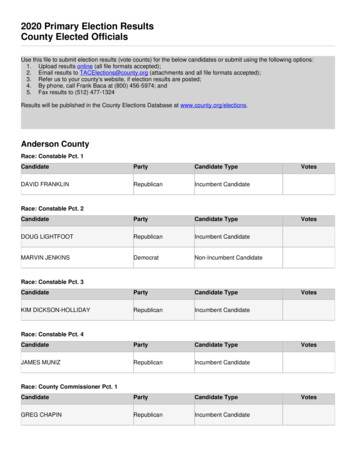

![OPTN Policies Effective as of April 28 2022 [9.9A]](/img/32/optn-policies.jpg)
